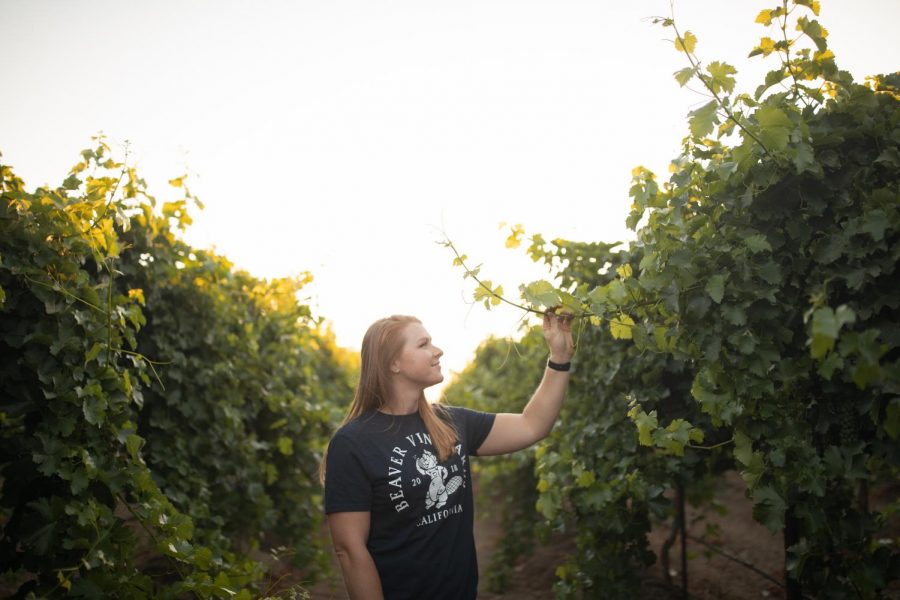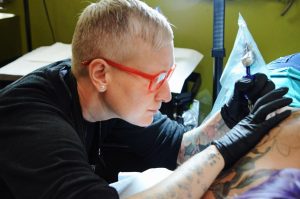So you wanna be a farmer?
Provided by Tara Coronado
Tara Beaver Coronado poses at her vineyard in Northern California. Despite the 10 to 20 year commitment of a vineyard, Coronado loves facing challenges, asking questions, and continually learning. Since planting her vineyard in April 2018, Coronado just completed her first harvest in late August of this year, a three-night culmination of two years of work.
September 19, 2020
Despite being a fifth-generation farmer, Tara Beaver Coronado didn’t plan on going into agriculture. Growing up on her parents’ farm, she always loved the outdoors and animals, but later considered a job as a teacher and eventually became a nanny. During a two-week vacation, she returned to her parents’ farm to help with the corn harvest and experienced a “lightbulb moment” in which she knew that agriculture was her true calling. She then quit her job, taking on the uncertainty of becoming a farmer.
Coronado got the idea for her current enterprise, Beaver Vineyards, now a 50-acre Sauvignon Blanc vineyard in Northern California, while participating in the California Farm Academy program in 2015.
“I just started thinking [about] what [resources are] around me,” Coronado said. “My family had no background in vineyards, so I found local farmers that had vineyards, and I called them constantly with questions. They really helped me go from an open field into a vineyard; otherwise, I would have never known what to do.”
Despite the 10 to 20 year commitment of a vineyard, Coronado loves facing challenges, asking questions and continually learning. Since planting her vineyard in April 2018, Coronado just completed her first harvest in late August of this year, a three-night culmination of two years of work.
“I’m just on a high from [the harvest]; it’s like it’s Christmas for me. I have put in so much work for the past two and a half years, and now I’m seeing it finally happening,” Coronado said. “That’s just been such an amazing feeling, so I’m getting a reminder right now of how much I love farming because I’m going through this harvest.”
Coronado also appreciates the freedom of being an entrepreneur and the feel of working outdoors in the field, despite not being able to take vacations. In fact, Coronado describes farming as being an entire lifestyle, with workdays lasting 10 to 12 hours in contrast to a regular 9 to 5 job.
“Being a farmer is really hard; you’re often underappreciated, but that’s not why we’re farming,” Coronado said. “I feel like a lot of us [farmers] are doing it because we love the land, we love being outside, and we really can’t imagine our life any other way.”
Besides the freedom and excitement from harvests, careers in agriculture can be extremely financially difficult. In Coronado’s case, she receives a paycheck once a year and must cover an entire year’s expenses with that one paycheck. According to Coronado, many farmers need to take out a loan to purchase equipment, land, and more, thus raising the risks associated with entering the agriculture industry. Because of the commitment associated with a vineyard, Coronado also emphasizes the time investment that comes with her enterprise.
“For me, [the finances have] been the hardest part,” Tara said. “You get used to working hard, so that part isn’t necessarily the hard part: it’s the money. It’s expensive, and you don’t make that much money in the end.”
Despite the fundamental role that farming plays in sustaining our society, Coronado admits that many people are unaware of not only the processes behind the production of food, but also the work behind the production of other crops like cotton that are then turned into clothing. For that reason, she has created large social media platforms with thousands of followers each on YouTube, Instagram, TikTok, and more to share her journey.
“I’m on social media because I think a lot of people have no idea what we do in farming or where their food comes from,” Coronado said. “I don’t want to look down on people for not knowing. There’s industries that I know absolutely nothing about, so I use social media as a positive platform to show people what we do everyday, and I feel like I’ve gotten a lot of positive feedback from that.”
Besides working toward increased transparency of her profession, Coronado also advocates for female empowerment in the agriculture industry. As the first “FarmHer” in her family, a term that she uses to describe herself, Coronado strives to be an inspiration for other aspiring female farmers.
“I’m just really proud to be the first woman [whose] husband is not in farming,” Coronado said. “I also want other women to know that you don’t have to marry a farmer or rancher to get into it. If you want to do it, you can do it.”
According to the 2017 Census of Agriculture from the Farm Bill Law Enterprise, the average farmer is 57.5 years old and women only consist of 36% of all producers, even though female workers make up 48% of significant decision-makers on farms. As both a young adult and a woman, Coronado has received offers of help from neighboring farmers, who hope to encourage more members of the younger generation to enter the industry and to support them along the way. Coronado describes the farming community as caring and uplifting despite individuals being so spread apart, and she also emphasizes the importance of having a similar environment in any career.
“A lot of people I talk to, we talked about how it’s not a competition within [agriculture]. Even if you grow the exact same crop, we’re not in competition,” Coronado said. “We are a community; we’re doing this together.”
In addition to advocating for women wanting to enter the industry, Coronado also encourages farmers, especially older male farmers who, in her experience, are less open in discussing farm-related stress, to talk about their problems to convey the message that no one is truly alone in their struggles.
“There’s no way to know that you’re not alone unless you talk about it,” Coronado said. “I’ve created a positive community around mental health as well, and a lot of men are getting involved. Every guy that gets involved, it’s huge because they’re showing other guys it’s okay to talk about [these issues].”
Because of the high risk inherent with the industry, Coronado, whose parents supported and helped her in obtaining land and in her loan, advises aspiring farmers with no background in the industry to find a mentor or reach out to organizations in California that help first-generation farmers start their enterprises. Ultimately, Coronado hopes that more people of the younger generation enter the industry, and that the community find a way to make it easier for young people considering a profession as a farmer to start their careers.
“Find something that you’re really passionate about and that you know you really want to do because it gets so difficult. Sometimes I question myself because there are very stressful days, and you have to love it.” Coronado said. “I do feel like [the younger farming community is] sharing this positive light of [agriculture] that is going to attract more people, so I hope that we can keep that up.”


















![“[Building nerf blasters] became this outlet of creativity for me that hasn't been matched by anything else. The process [of] making a build complete to your desire is such a painstakingly difficult process, but I've had to learn from [the skills needed from] soldering to proper painting. There's so many different options for everything, if you think about it, it exists. The best part is [that] if it doesn't exist, you can build it yourself," Ishaan Parate said.](https://harkeraquila.com/wp-content/uploads/2022/08/DSC_8149-900x604.jpg)




![“When I came into high school, I was ready to be a follower. But DECA was a game changer for me. It helped me overcome my fear of public speaking, and it's played such a major role in who I've become today. To be able to successfully lead a chapter of 150 students, an officer team and be one of the upperclassmen I once really admired is something I'm [really] proud of,” Anvitha Tummala ('21) said.](https://harkeraquila.com/wp-content/uploads/2021/07/Screen-Shot-2021-07-25-at-9.50.05-AM-900x594.png)







![“I think getting up in the morning and having a sense of purpose [is exciting]. I think without a certain amount of drive, life is kind of obsolete and mundane, and I think having that every single day is what makes each day unique and kind of makes life exciting,” Neymika Jain (12) said.](https://harkeraquila.com/wp-content/uploads/2017/06/Screen-Shot-2017-06-03-at-4.54.16-PM.png)








![“My slogan is ‘slow feet, don’t eat, and I’m hungry.’ You need to run fast to get where you are–you aren't going to get those championships if you aren't fast,” Angel Cervantes (12) said. “I want to do well in school on my tests and in track and win championships for my team. I live by that, [and] I can do that anywhere: in the classroom or on the field.”](https://harkeraquila.com/wp-content/uploads/2018/06/DSC5146-900x601.jpg)
![“[Volleyball has] taught me how to fall correctly, and another thing it taught is that you don’t have to be the best at something to be good at it. If you just hit the ball in a smart way, then it still scores points and you’re good at it. You could be a background player and still make a much bigger impact on the team than you would think,” Anya Gert (’20) said.](https://harkeraquila.com/wp-content/uploads/2020/06/AnnaGert_JinTuan_HoHPhotoEdited-600x900.jpeg)

![“I'm not nearly there yet, but [my confidence has] definitely been getting better since I was pretty shy and timid coming into Harker my freshman year. I know that there's a lot of people that are really confident in what they do, and I really admire them. Everyone's so driven and that has really pushed me to kind of try to find my own place in high school and be more confident,” Alyssa Huang (’20) said.](https://harkeraquila.com/wp-content/uploads/2020/06/AlyssaHuang_EmilyChen_HoHPhoto-900x749.jpeg)














